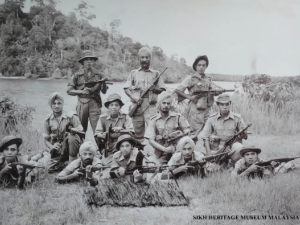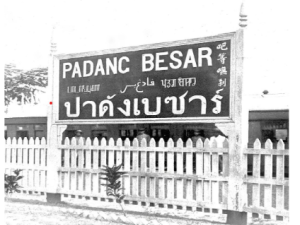 |
Sikh heroism and bravery have been held in high esteem by many famous contributors, writers and distinguished statesman. Words are words, their attributes, bravery can be only described but the true essence of the contribution is exemplified by their gallant display and fortitude. Sikhs were respected by other races and they took them with them for protection and defense. It is their never-die spirit and sacrifice that impressed others and the Sikh Diaspora unfolded as another chapter in history; inherent are the virtues of humility and selfless service to others. They were adaptable, versatile and they integrated with others, but maintained their Sikh beliefs, faith and culture. Here are some gems of quotes on Sikh heroism worth cherishing and remembering.
Harchand Singh Bedi: "Nobody nowadays knows anything about those times… the younger generation think their secure lives have fallen in their laps. If you give all these details to the newspaper, the new generations will come to know."
To this day, the sacrifices made by the Sikh soldiers are largely unknown to most people. Sikhs fought for the rights of others. Sikhs fought for others to live and Sikhs fought for their faith and beliefs. The Gurus sacrificed their lives for dharma but never flinched or renounced their unique belief in the Sikh faith. The Panth or path for Sikhs to become the bravest soldiers that the World has ever seen was laid by Guru Nanak Dev Ji, the Founder of the Sikh faith. It was he who sowed the seeds of the bravery in the Sikhs and the whole world reaped their benefits. The succeeding Gurus tendered this, and the harvest lay in the destiny of Guru Gobind Singh. The steel for forging the sword was also provided by Guru Nanak.
Sikh soldiers have had a long and glorious tradition of military service. They have fought in many battles and have been known for their bravery, exploits, glorious and heroic deeds, stirring episodes of courage, devotion to duty and deep sense of loyalty. Their paramount attribute in the battle is to be their fearlessness. Sikh soldiers were known for their bravery and steadfastness. They volunteered to fight for the British Imperial Forces in many theatres. The contribution for world peace by Sikhs is indeed a very good and gallant one. The total Sikh population maybe small compared to other races and one is inspired, impressed and fascinated by the achievements made by Sikh soldiers world over.
Sikhs have fought the battles of the Empire and the Quadruple Entente on many awful but glorious fields in Belgium and France, to the Dardanelles, to Egypt, to the Persian Gulf, to East Africa, and to other places where the Union Jack is being gallantly upheld by them. Sikhs played a major part in Northern France and Flanders; of their work in Tsingtau; of their defence of the Suez Canal; of their service in arresting the advance of the Germans forces in East Africa; of their success in Chaldea; and last but no least, of their valour on the Gallipoli Peninsula. The list is endless! The Spirit which has manifested itself in the contribution by these Sikh soldiers to the Empire's fighting strength is not merely unabated, but rising higher.
The bravery shown by Sikhs during the both World Wars had become a glorious chapter in the history of warfare. No living glory can transcend that of their supreme sacrifice. Finally, let us spare these remarkable thoughts below.
Martial India, F.Yeats-Brown, 1945:
"A remarkable people, the Sikhs, with their Ten Gurus (dispeller of darkness), five distinguishing marks, and their initiation rites of water (amrit) stirred with steel; a people who have made history, and will make it again"
General Sir Frank Messervy KCSI, KBE, CB, DSO
"Finally, we, that live on, can never forget those comrades who in giving their lives gave so much that is good to the story of the Sikh Regiment. No living glory can transcend that of their supreme sacrifice, may they rest in peace.
In the last two world wars 83,005 turban wearing Sikh soldiers were killed and 109,045 were wounded. They all died or were wounded for the freedom of Britain and the world and during shell fire, with no other protection but the turban, the symbol of their faith."
General Bardwood: "I will not be slightly worried or reluctant to leave my wife and young daughter under protection of any Sikh soldier." (Cited in Gurmat Prakash Amritsar, Feb., 1997)
Maj. Gen. Fazal Muqeem Khan, author of book 'Pakistan's Crisis of Leadership': "The major reasons for our defeat are Sikhs. We are simply unable to do anything before them despite our best efforts. They are very daring people and are fond of martyrdom. They fight courageously and are capable of defeating an army much bigger than them."
On 3rd December 1971, we fiercely and vigorously attacked the Indian army with infantry brigade near Hussainiwala border. This brigade included Pakistan army's Panjab regiment together with the Baloch regiment. Within minutes we pushed the Indian army quite far back. Their defense posts fell under our control. The Indian army was retreating back very fast and the Pakistani army was going forward with great speed.
Our army reached near Kausre-Hind post (Kasure). There was small segment of Indian army appointed to defend that post and their soldiers belonged to the Sikh Regiment. A few number of the Sikh Regiment stopped our way forward like an iron wall. They greeted us with the ovation (Slogan) of 'Bolé-so-Nihal' and attacked us like bloodthirsty, hungry lions and hawks. All these soldiers were Sikhs. There was even a dreadful hand-to-hand battle. The sky filled with roars of 'Yaa Ali and Sat Sri Akal'. Even in this hand-to-hand fighting the Sikhs fought so bravely that all our desires, aspirations and dreams were shattered.
In this war Lt. Col. Gulab Hussain was killed. With him Major Mohammed Zaeef and Capt. Arif Alim also died. It was difficult to count the number of soldiers who got killed. We were astonished to see the courage of those, handful of Sikh soldiers. When we seized the possession of the three-story defense post of concrete, the Sikh soldiers went onto the roof and kept on persistently opposing us. The whole night they kept on showering fires on us and continued shouting the loud ovation of 'Sat Sri Akal'. These Sikh soldiers kept on the encounter till next day. Next day the Pakistani tanks surrounded this post and bombed it with guns. Those, handful of Sikhs got martyred in this encounter while resisting us, but other Sikh soldiers then destroyed our tanks with the help of their artillery. Fighting with great bravery they kept on marching forward and thus our army lost its foothold.
Alas! A handful of Sikhs converted our great victory into big defeat and shattered our confidence and courage. The same thing happened with us in Dhaka, Bangladesh. In the battle of Jassur, the Singhs opposed the Pakistan army so fiercely that our backbone and our foothold were lost. This became the main important reason of our defeat; and Sikhs' strength, safety and honour of the country, became the sole cause of their victory.
Lord Mountbatten (India's Last British Viceroy):
Guru Nanak Dev Ji was a great poet, philosopher and saint. His teachings are of universal application and his message of love, service and sacrifice will continue to inspire coming generations. (Excerpt from speech in London on Guru Nanak's Quincentenary)
Rabindranath Tagore: Banda was a hero - a 'lion in shackles' The Sikh community may have taken years to offer its collective homage to the ascetic-turned-warrior, Baba Banda Singh Bahadur, but his universal appeal was recognized by poets and intellectuals even before India became independent. Banda was immortalized in literature by one of the greatest poets of the times, Rabindranath Tagore. It was in 1899 that the Nobel Laureate - whose 150th birth anniversary was celebrated on May 9, ahead of Baba Banda Singh Bahadur's tercentenary of Sirhind Fateh on May 14, 2010 -wrote his famous poem 'Bandi Bir' (Captive Hero) based on the Sikh warrior and his brave Sikh fighters who took on the tyrannical Mughal army despite being outnumbered and ill-equipped in terms of weapons. He sang paens to the great warrior, using terms like "singher moto shrinkhalgato" (lion in shackles) to describe his arrest by the Mughals. The poem, which is part of the academic syllabus in every English and vernacular medium school of West Bengal, is also one of those powerful creations of Tagore which mothers love to teach their children, in every Bengali household. It was also universally recognised as a source of inspiration to several other Bengali writers as well as the militant youths of those times who were fighting for India's Independence.
"This poem can be found in the book of poems by Tagore - 'Katha-O-Kahini' and is an extremely popular, inspirational poem," says Rajat Kanta Ray, vice-chancellor of the Visva Bharati University. (Katha-O-Kahini) is a collection of Tagore's poems where the poet featured great inspirational figures, not just from Sikh community but also Rajput and Maratha war heroes, who set high standards of bravery and valour.
Tagore did not base his poem on Banda Bahadur's tales of ferocious battles with the Mughal Empire. He, instead, chose the fag end of the warrior's life when Banda was fettered and locked up in a cage by the Mughals after his arrest, and was about to be executed. Banda's fortitude and his brave demeanour even in the face of such adversity became the inspiration for Tagore, who wanted to exhort youths to lead a life of bravery and self-respect, says the scholar.
The most famous lines from the poem talks of how Sikhs, despite shackled, held prisoners and facing torture of their tormentors, remained unmoved, without even uttering a cry and it was only the Guru's name which moved them at that time.
|
|
| (The chants of the Guru have led to the Sikhs rising in protest They are fearless ...) |
Extract from Rabindra Nath Tagore's poem (Bandi Bir) written in praise of the great Sikh warrior:
References:
Unsung Real Sikh Hero Baba Banda Singh Bahadur by Aman Singh-Sikh Philosophy Network.
Courtesy: Jhimli Mukherjee Pandey in Kolkata





